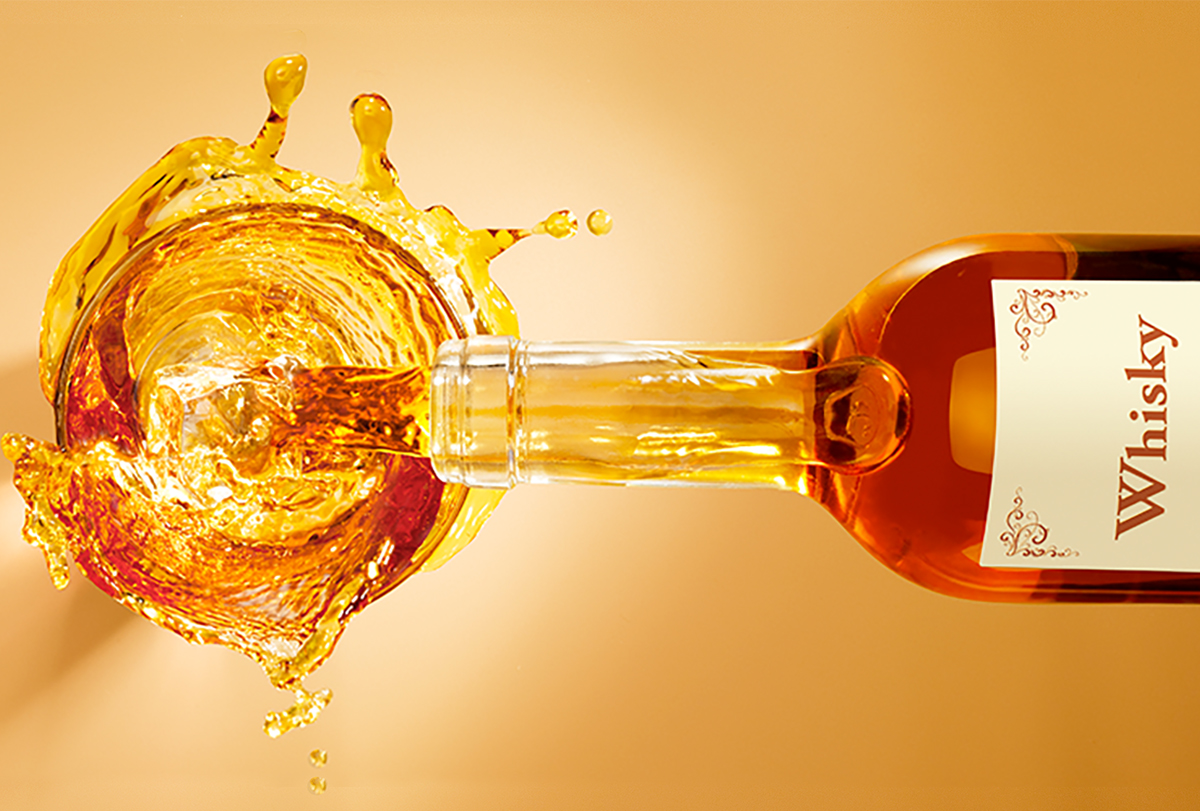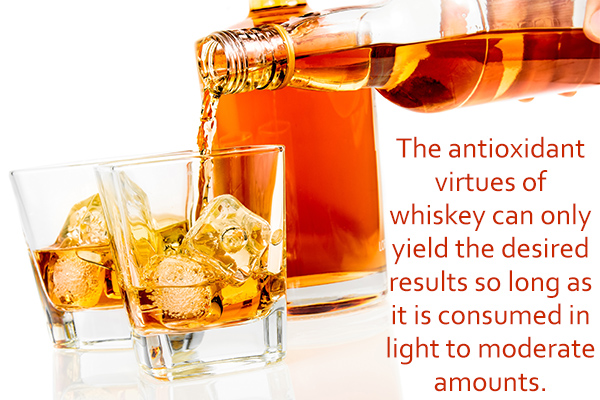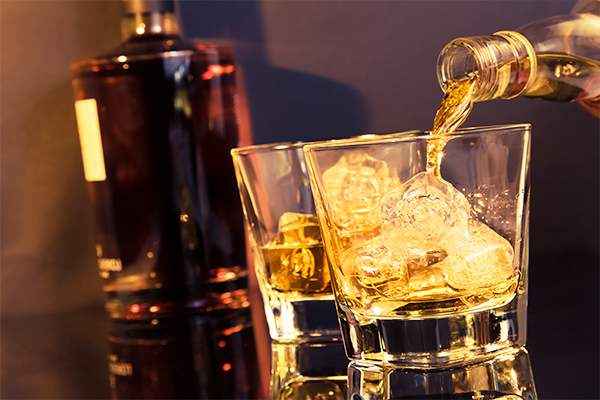In this article:
Whiskey is an alcoholic beverage that is obtained through grain distillation. It is 40% alcohol, which qualifies it as hard liquor. For a whiskey to yield any health benefit, it should be consumed in moderation and with the necessary precaution.

The roots of whiskey can be traced back to the Celtic regions of Scotland and Ireland, with both these countries claiming provenance of the drink.
Today, Scotland is the leading producer of whiskey, with Ireland, Canada, and America following suit, each with its own unique brand of whiskey.
Nutrient Content of Whiskey
According to the US Department of Agriculture, 100 grams of distilled whiskey contains the following: (1)
- Water: 63.9 g
- Energy: 350 kcal
- Carbohydrates: 0.1 g
- Iron: 0.02 mg
- Potassium: 1 mg
- Alcohol: 36 g
Types of Whiskey
The multiple varieties of whiskey hailing from different geographical locations tend to come with their specific character, name, taste, and ingredients.
Scotland is known for producing a specific type of whiskey called scotch, which is distilled from malted barley. America is known for yet another variety of whiskey called bourbon, which is distilled from corn.
Other than bourbon, some other popular types of American whiskey include corn whiskey, rye whiskey, malt whiskey, rye-malt whiskey, wheat whiskey, and Tennessee whiskey.
Production of Whiskey
The production process involves steeping the grains and then adding yeast to the mix. The yeast acts as a fermenting agent that breaks down the sugars in the grains to release alcohol as a by-product.
The liquid alcohol is then separated from the grain mash through various distillation processes depending upon the type of whiskey to be produced.
Both Scottish and American whiskeys go through a double round of distillation, whereas Irish whiskey is distilled thrice to produce the final product. The more distilled the product, the lighter and smoother is its flavor.
Grains with high sugar content naturally produce sweeter-tasting whiskey. Aging the whiskey also helps mellow its taste. Whiskey is traditionally stored or aged in barrels, and the wood interacts with the distilled liquid inside to impart it an appetizing flavor.
Health Benefits of Whiskey

The potential benefits of drinking alcohol should not compel non-drinkers to start drinking or responsible drinkers to overindulge. The principle of moderation especially applies to alcohol, as excessive intake can severely harm your body and your social well-being.
A measured intake of whiskey is believed to offer the following benefits.
1. May help protect against cognitive disorders
All types of alcoholic beverages, including whiskey, have been shown to exhibit antioxidant properties. (2)
The antioxidant phytochemicals in whiskey positively influence GABA receptors to maintain a healthy chemical balance in the brain. This can help protect against the debilitating repercussions of depression, Alzheimer’s disease, dementia, schizophrenia, etc., (3)(4) but more research is needed to establish these claims conclusively.
The phytochemicals from whiskey and other dietary sources may help reduce cognitive dysfunction and delay the onset/progress of many neuropsychiatric disorders and neurodegenerative disorders.
2. May decrease the risk of heart disease
People who engage in light to moderate drinking tend to have a lower risk of congestive heart failure, stroke, diabetes mellitus, coronary artery disease, and total mortality. However, there is no direct study to link these factors.
Conversely, people who consume excessive amounts of alcohol are more prone to cardiovascular problems. (5)
Alcoholic beverages such as whiskey and wine are full of antioxidants that may reduce your cardiovascular risk when consumed in limited amounts, but excessive intake can have the opposite effect.
3. May help control urate levels
High uric acid levels are responsible for painful conditions such as gout, wherein the excess uric acid crystallizes and accumulates in the joints. Some clinical studies suggest that light to moderate whiskey consumption can promote the excretion of urate through the urine. (6)
Whiskey may work as a diuretic and increase your urine output, thus helping your body to flush out the excess uric acid from its system.
4. Other benefits
Some other suggested benefits of limited whiskey intake include weight loss and improved digestion, but these claims have little to no scientific backing.
Recommended Intake of Whiskey

Alcohol should only be consumed in moderation or it to yield any health benefits. In simple terms, moderate drinking refers to a balanced level of alcoholic intake at which its advantages outweigh the risks.
According to the US Department of Agriculture and the 2015–2020 Dietary Guidelines for Americans, men should not consume more than 1–2 drinks a day, whereas women should stick to only a single drink a day. (7)
In the American context, one drink usually amounts to 12 ounces of beer and 5 ounces of wine, but only 1½ ounces of whiskey, which is hard liquor and therefore should be consumed more judiciously. (8)
What Is a Hot Toddy? Does It Help Relieve a Common Cold?
A hot toddy is an anecdotal concoction that is mostly used for relieving the symptoms of the common cold and flu.
Typically, a hot toddy is prepared by mixing lemon, honey, and hot water with whiskey, but you can also use green or black tea instead of alcohol. The immune-boosting properties of this tonic are mostly attributed to the nutrients found in lemon and honey, rather than whiskey.
What Is Excessive Drinking?
Binge drinking or heavy drinking refers to having several drinks in a single session. If a man consumes five or more drinks in one sitting or about 2 hours, it qualifies as binge drinking. The same is true for women who consume four or more drinks during this time frame.
Unlike alcoholism, which involves sustained heavy drinking on a long-term basis, binge drinking can be an isolated or occasional occurrence.
Different Forms of Alcohol Abuse
The following are the basic forms of alcohol abuse:
- Heavy drinking, which essentially means drinking copious amounts of alcohol regularly
- Any drinking by pregnant women
- Any kind of alcohol intake by people younger than 21 years of age
Harmful Effects of Drinking Too Much Whiskey
Unchecked alcohol consumption or alcohol abuse not only hampers your overall physical and mental health but also poses an immediate risk to your own safety as well as the safety of others around you by dulling your senses.
Excessive drinking has been associated with motor vehicle accidents, violence, and sexual risk behaviors.
Moreover, it can lead to many long-term health problems such as high blood pressure (hypertension), inflammation of the liver (alcoholic hepatitis), scarring of the liver tissue (cirrhosis), and cardiomyopathy. (9)
Alcohol can induce a temporary analgesic effect by blocking certain pain signals to the brain, but excessive dependence on alcohol for managing pain can do more harm than good and can lead to more complications in the long run. (10)
ALSO READ: 10 Health Consequences of Excessive Drinking
People Who Should Not Consume Alcohol at All
The following people should steer clear of any kind of alcohol:
- People below the age of 21
- Women who are pregnant or may be pregnant
- People who are driving or planning to drive
- People who are participating in an activity that requires skill, coordination, and alertness
- People who are recovering from alcoholism
- People with little self-control
- People who are taking certain over-the-counter or prescription medications
- People with certain medical conditions
It is generally not recommended to start drinking alcohol if you are not already.
Final Word
Whiskey is extremely low in saturated fat, cholesterol, and sodium, and it also has a negligible level of carbohydrates. It has only 70 calories in 100 ml. However, it is, first and foremost, an intoxicant that should be consumed judiciously and responsibly.
You should be aware of both the risks and benefits associated with alcohol consumption and stay within the stipulated limit to avoid any undue complications.
- Was this article helpful?
- YES, THANKS!NOT REALLY


